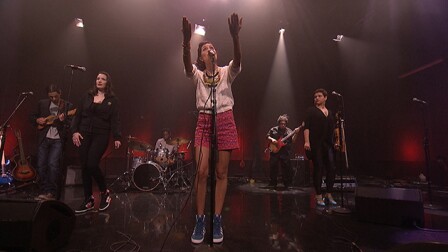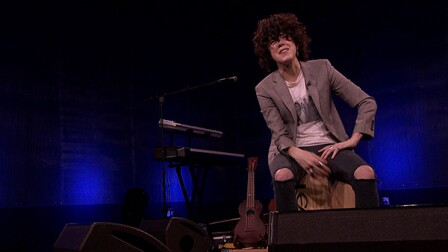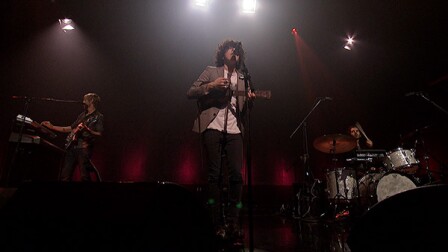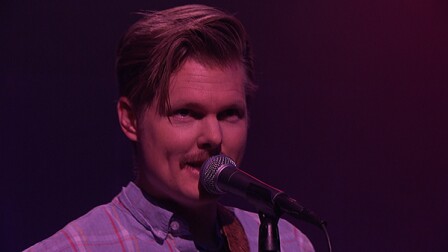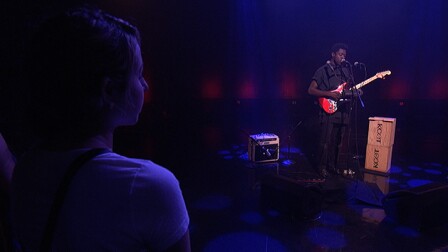
First Person: La Santa Cecilia
La Santa Cecilia exemplifies the modern-day creative hybrid of Latin culture, rock and world music. This Grammy Award-winning group draws inspiration from all over the world, utilizing Pan-American rhythms like cumbia, bossa nova, rumba, bolero, tango, jazz, rock, and klezmer music. Watch their exciting performance on Studio A.
Discover more about La Santa Cecilia in their own words.
On Their Name
Marisoul Hernández La Santa Cecilia is considered the patron saint of musicians. Venerated November 22nd. Mariachis, all kinds of musicians, trios- we give thanks, we celebrate La Santa Cecilia, we ask her to take care of our instruments, or our voice, to give us more work. It's a tradition that some of us grew up with. Growing up with street musicians; they taught us how to give thanks to Saint Cecilia. And there are tons of Saint Cecilia bands: of mariachis, duets, orchestras called La Santa Cecilia of Oaxaca and things like that. So I guess we wanted to be like, La Santa Cecilia of Los Angeles, California.
Miguel Ramírez: But it wasn't like a religious thing, it was more so like a faith that we all had and what we can accomplish with music, and what we could accomplish and believe in ourselves.
José Carlos: We grew up in Olvera Street here in Los Angeles, California, and we grew up playing, busking out on the streets on the weekends. That was our pastime. And we would play every weekend and we would sing boleros, rancheras, traditional Latin American huapangos or anything that was related to Latin America, and that was our pastime, that was our home!
MH: Well more than our pastime, because I mean, we got to be there on the weekends. And that's where I met Pepe and his brother when we were like teenagers. I mean, my parents made me go. I guess it was their way of keeping me out of trouble and to make some extra cash for myself, to buy my things as a teenager so I wouldn't ask my parents for stuff. They'd say like, go sing at Placita and busk and that's how you're gonna make some kind of living and stuff. And that's how I met you on the weekends, and we were always there every weekend! We were there from 11 a.m. to 6 p.m. singing. He and his brothers would sing on one side of the street, and I would sing with some other musicians on the other. And we would just kind of say like, "Hey, what's up." Everyone kind of respects each other's territory, their turf -- because when you're a street musician, you've got to take care of where you're working at.
MH: The streets were like our school, or at least my musical school. I didn't take any musical lessons or have a career in music from school, but I did learn busking and singing loud and talking to the crowd and to give thanks to La Santa Cecilia for the work that I received, and things like that.
JC: We definitely owe a lot to the musicians that still play at Olvera Street on the weekends. We owe them a lot, because they taught us the fundamentals of playing -- playing hard, playing loud, not to be scared and go up to people and talk to them, ask them, "Hey, gustan la cancion? ¿Qué canción gusta? Tenemos la "Sabor a Mí," tenemos "El Rey" o, "Guantanamera." When they didn't know a song that they would ask: "Oh I don't know that one, but I know another song that sounds just like that!" Yeah it has the same meaning. So I think we owe a lot to the street, to Olvera St. to the musicians there, and that's how we met.
MR: Well, I met you there, but I met Marisoul in another band when we were like 18 or 19. It was like a Spanish rock group and I hated it. It was bad. I didn't like it. It sounded like The Cure and so anyways, we met in that group and I thought she was a great singer, and then years later we reconnected. She was playing with Pepe and the trio, with Pepe's brother, and they were playing boleros and I would play with them on the weekends at Olvera Street.
Alex Bendaña: Yeah, and then I met this guy in the University Cal State L.A., and we were taking music courses and he was playing with the Afro-Latin band; I was playing with the jazz band, and he told me about this project he started with Marisoul and Pepe.
On the influence of Latin American boleros, rancheras, the classics and New Wave
MH: We were all working as musicians. Pepe and I eventually made a trio with his brother and we would work and we would do weddings, and baptisms, and serenades, and we worked. That's what we did. During the week, we'd work at a radio station singing the news, and on the weekend we'd sing at fiestas for hire; an hour, two, three, four, five hours. They would do salsa gigs, jazz gigs, and we were always the background music. We were doing just gigs where they hire you for a certain amount of time, and they keep talking while you were playing. I think we all felt the need to make music that actually moved people, and where we could tell our own stories, or we could say what we liked or didn't like, and we could experiment with all the traditional music, with all the stuff we were listening to. Playing around at gigs, to just be free and experiment. It was all just an experiment, but with the desire to really do something with music and to go somewhere.
AB: I mean, we all quit our jobs! Me and [Miguel] Osso had two jobs working 9 to 5, and we were like, man we've got to commit to this music thing, because that's what we love, that's our passion. And so we all gave up our jobs and full time, right here.

MR: Kind of blindly. We hit some really hard times where we didn't have anything. We didn't think about that when we started, just saying, "You wanna go full-time La Santa Cecilia?" And when we did that, it was hard. It was really hard. And luckily everyone was able to stick it out, but I think the music kind of was our teacher. We were learning as we were going; experimenting with mixing this and mixing that, and what happens when you mix this with that, and what if we take this from here? We're taking all our experiences and all our sensibilities and influences, and just trying to create something different and new and exciting. Luckily when we would play it out we would see that people were reacting in a positive way to it. Because they understood that we were just kind of like a bi-cultural experiment of what happens when you grow up traditionally Latino in your home, and then you growing up in the United States at the same time. And you have this kind of weird disharmony sometimes with like, "Oh, I'm Latino, and I'm American." And you don't know what to do with that identity. And luckily within the band, all of our experimenting helped mend all those things together.
JC: I think that's one of the cool things when we started La Santa Cecilia, we let ourselves go free. There was never like, "Oh, we're gonna start this band that's just going to play rock or just going to play cumbia or just boleros." Everyone was free to express themselves, and it still is. To express themselves however we want, however we feel the music. There's no right or wrong -- well, there is a wrong, but there's more rights than wrongs. And we all have different influences. I really like Nirvana; in high school, I loved Metallica. But I also love the trios. I love Ramón Ayala. And that was my influence into La Santa Cecilia; and I think every one of us has a different influence.
MH: Growing up, I loved bands like The Beatles and Janis Joplin. I loved bands like The Specials and punk rock and things like that. During the week, I was going to Hollywood High School and I would dress in black all the time, and I was a roquera! I was like a rocker, and I was all about that. But it was tough because on the weekends I had to go to Olvera Street. and sing on the weekends, and the musicians would have none of that roquera. They'd be like, no, you have to dress Mexicana and wear your dresses and your blouses. So I felt like I was living two lives; I felt separated. During the week I was one thing, and during the weekend I was all about Latin America and my family and traditional music. I'm really glad that I got to meet my friends and now we can celebrate that and say like, "Hey, we will go from a bolero to a ska to a bossa nova to banda to norteño and it's fine, no?"
MR: It's a big part of what the identity is of young people our age. To be kind of embracing of both our cultures, to be not ashamed of either one of them, and to carry each one with a lot of pride in what we are and where we come from, and what we receive from our families traditionally, and what we receive here in the United States. Both are a value equally. We learn how to join those two things together, and we're stronger people because of that. We can swing through both cultures equally without a problem.
AB: Even if you're not Mexican! My family is from Nicaragua, and I was born in Venezuela. But growing up in L.A., I mean, you just have that whole Mexican culture. My first band was a norteño band, and I would be dressed as a cowboy, playing in these little quinceañeras and saying that I was from Durango, Mexico...I had to lie or they would kick me out! It's that whole experience of growing in L.A. so close to Mexico, you get a taste of that too. You get all that culture.
On the Cross Cultural Sound
MR: No one here is one-dimensional. I don't know anybody that's like, "I'm just this and that's all I am." The cool thing about the band is that we're able to express all of what life is; the good stuff, the bad stuff, the happiness and the sadness, and we kind of just choose to express all of it. We don't hide that we're vulnerable or sad or hurt, or affected by some sort of political issue, or that we're in love or we're happy, whatever. We just try to express all of it. Like Pepe said, we don't try to limit what we are or who we are or what we can express.

On the Song "El Hielo"
MH: The need to do a song like "El Hielo" comes from our own experiences, from seeing a lot of our friends, even our bandmates here not having the proper documentation to travel. It's a bit frustrating when you see your band grow, and you get asked to play in Mexico or in Texas, and you have to figure out the right route that's anti-immigration checkpoints. We have these feelings and frustrations, and we felt the need to talk about it because it affects so many people. So many of our peers. It was a way for us to support all the people that were coming out of the shadows, that were saying, "Yes, I am undocumented and I am afraid." It was something that we've all gone through. We're all children of immigrant parents, or we've come here into this country when we were kids. It was something we had to say.
MR: But it was a need to tell our own story, to own it and say this is our story. It wasn't like we planned to do it with months in advance. It was kind of one of those things that we started talking about, and the more we started talking about it, and the day we actually wrote it, was when all of the emotions that we were feeling about that particular subject came out. And we were crying, talking about it, and it was like one of those things where you don't even know you feel that until you talk about it or you write about it, until it starts coming out. It wasn't one of those things that was pre-meditated. We're not a politically-minded band with political intentions. It was just our need to tell our story, really.

On Documentation
JC: That whole experience with the band of me not having the proper documentation -- I was brought here at the age of six years old, and I lived here for 26 years. I went to school here, just like millions of dreamers here in L.A. and in the U.S. We were brought here with our parents. I was brought here at the age of six, and I realized one day that I couldn't get a driver's license. Even though I spoke English, even though I went to school here, even though I went to college here. I couldn't get a license or even a job. And like Osso said, we felt the need to write this song because of the experiences we were living; through our parents and friends, through everyone. Fortunately, I was approved for the deferred action...and finally after seven years, after starting the band, I'm so happy to say that after seven years I was able to travel back to Mexico with the band and perform at an important event called "Viva Latino." But we can't forget the struggle or the people that are still without papers, the immigrants that come here to look for a better life, who are looking just to support their families. We're still continuing in our support to all those people out there, and we're never going to forget. We have to support each other. I think that's the key of life: support one another.
On their Grammy
MH: Man, we were overwhelmed, full of joy, of a lot of pride. Tears of joy. It means a lot because we come from parents that came here to better their lives, that came to try to show us a better way. It made us really, really proud to go out there and say we were this band from L.A. who grew up on the streets of L.A., looking at and dreaming of what we could do with music, and also representing the beauty of what can happen when someone is given the chance to live in this country, to work in this country, and the positive things that we can give back to our culture, to music. We dedicated the award to the more than 11 million undocumented people because we want people to just remember that there are people out there who need it, that are working really hard behind the scenes; in the kitchens, domestic workers, everywhere you look. The country is being moved still by immigrants. We just wanted to show that here we are, you gave us a chance and we are going to take advantage of it, and take music to the highest level.
On Immigration
MR: When we go to Mexico, we talk to people all the time like, "Hey, how important is the immigration issue here in Mexico?" And they say sometimes it's not that important, depending on what part of Mexico you're talking about. If you're in Mexico City, sometimes it's a lot easier to get a visa than your friend in Michoacan or something like that. It's important for the people that have family emigrating constantly to Mexico and that have family members here, because they're being deported. They're being sent back and that affects them in a financial way, and also it devastates the family. It affects them all the time and in so many different ways. I think for us the important thing is to always stay connected to our families, our friends, where we come from; just to stay with our eyes and our ears open to what's going on with the people that surround us constantly. Whether we're in Mexico or South America or wherever we may be, I think we're just going to be open to what's going on around us and hopefully we'll be able to write about it and express that.
AB: But people migrate all the time. From Central America to Mexico, all the way to South America and up. There's issues in Spain where people are having trouble with immigrants and stuff like that. So that's a global topic, and we know that the song itself is gonna reach many people, not just in L.A. It's going to be a universal type of connection that we have.
MH: And I think one of the reasons why we wrote "El Hielo" was that we wanted to humanize this topic of immigration, of deportations. We're talking about real people, no? Eva is my mother; she's a domestic worker, and that's who I'm talking about in the song. Sometimes people can be intimidated because they think that they have a job that isn't a lawyer, or a businessman... it's like, well, just because he's a gardener or a domestic worker doesn't mean that you can intimidate them or not give them pay or things like that. It was important for us to put a name, to put faces of real people in our video, of real people that are going through the process of deportation, to really show people what happens when you deport someone; when you take a man, a woman, a father, a son, a child, a student, from their house, from where they live, where they're from because they've been here a long time. What happens when someone's deported; the reality. Not just numbers, not just statistics, but real human beings. That was very important to say.
MR: We utilize whatever attention that we do get as a platform to talk about what we want to talk about, and to take our music as far as we want. That's the thing. All of us here want to take our music as far as we possibly can. Our dream is to make the best songs we can make, make the best records we can make, to be able to tour all over the world, be able to touch people with music all over the world. So, we try to use that platform to push all that, to push our ideas, our love and our passion for what we do.

